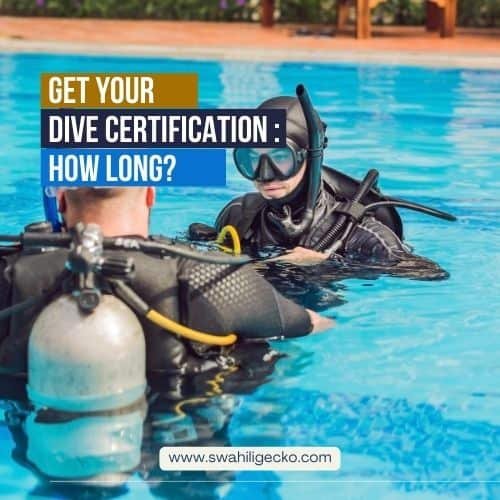Embarking on the journey to become a certified scuba diver is an exciting adventure, filled with the promise of exploring the underwater world. But before you can gracefully glide through coral reefs and encounter fascinating marine life, you’ll need to acquire the necessary skills and knowledge. Understanding the time commitment involved is crucial for planning your diving education and ensuring a successful learning experience. This article will break down the various factors influencing the duration of scuba diving certification, helping you estimate how long it will take to become a qualified diver and start enjoying the wonders that lie beneath the surface.
Factors Influencing Scuba Diving Course Duration
Several elements contribute to the timeframe required to learn scuba diving. These include the type of certification you pursue, your individual learning pace, and the scheduling options offered by your chosen dive center.
- Certification Level: Different certification levels, from introductory courses to advanced programs, require varying amounts of training;
- Learning Pace: Some individuals grasp concepts and skills more quickly than others. This natural variation will influence the overall time needed.
- Course Structure & Schedule: Dive centers offer courses with different schedules, ranging from intensive weekend programs to more extended, multi-week sessions.
- Instructor to Student Ratio: A smaller class size often translates to more personalized attention and potentially a faster learning curve.
Typical Scuba Diving Certification Timelines
Here’s a general overview of the time typically needed for some common scuba diving certifications:
- Discover Scuba Diving (Introductory): This is a brief introduction, usually lasting just a few hours, and doesn’t result in certification.
- PADI Open Water Diver: Generally takes 3-4 days of full-time study, or several weeks of part-time classes.
- PADI Advanced Open Water Diver: Typically requires 2-3 days of diving and instruction after completing the Open Water Diver certification.
- Rescue Diver: Plan for about 2-3 days, focusing on emergency response and problem-solving skills.
A Detailed Look at Open Water Diver Certification Time Investment
The PADI Open Water Diver certification is the most popular starting point for aspiring scuba divers. Let’s break down the time commitment involved:
| Component | Description | Estimated Time |
|---|---|---|
| Knowledge Development (Theory) | Learning the fundamentals of scuba diving through online modules, textbooks, or classroom sessions. Includes quizzes and a final exam. | 10-15 hours |
| Confined Water Dives (Pool Sessions) | Practicing essential scuba diving skills in a controlled environment like a swimming pool. | 4-6 hours |
| Open Water Dives | Applying learned skills in a natural underwater environment under the supervision of an instructor. | 4 dives, typically spread over 2 days (6-8 hours total) |
| Total Estimated Time: 20-30 hours | ||
Accelerated vs. Extended Scuba Learning Options
Depending on your availability and learning preferences, you can choose between accelerated and extended scuba diving courses. Accelerated courses condense the training into a shorter timeframe, often involving long days of intensive instruction. Extended courses spread the learning over several weeks, allowing for more flexibility and time to absorb the information. Consider your own learning style and schedule constraints when making this decision.
Tips for Efficient Scuba Diving Education
To maximize your learning efficiency and minimize the time required, consider these tips:
- Complete Online Theory in Advance: Many dive centers offer online learning modules that you can complete before your in-person sessions.
- Practice in a Pool (Optional): If possible, spend some time practicing basic swimming skills and familiarizing yourself with snorkeling equipment before the course.
- Ask Questions: Don’t hesitate to ask your instructor questions whenever you’re unsure about something. Clarifying concepts early on will save you time in the long run.
- Stay Hydrated and Rested: Being well-rested and hydrated will improve your focus and ability to learn.
FAQ: Scuba Diving Learning Timeline
How long does it take to get scuba certified if I already have some diving experience?
Even with prior experience, you’ll still need to complete the full certification course to ensure you meet the required standards. However, your existing knowledge might allow you to progress more quickly.
Can I learn scuba diving in a weekend?
Yes, some dive centers offer accelerated weekend courses for the PADI Open Water Diver certification. These courses are intensive and require dedication.
Is it possible to fail a scuba diving course?
Yes, it’s possible to fail if you don’t meet the required performance standards in the knowledge assessments, confined water skills, or open water dives. However, instructors are dedicated to helping students succeed, and remedial training is often available.
What if I need more time to complete a specific skill?
Most instructors are flexible and willing to provide extra practice time if needed. Don’t be afraid to communicate your needs to your instructor.
Does the time of year affect how long it takes to get certified?
Not directly. However, weather conditions can sometimes impact the scheduling of open water dives. Choose a time of year with favorable weather for the best experience.
Learning to scuba dive is a rewarding experience that opens up a whole new world of underwater exploration. The time it takes to become certified depends on various factors, but with proper planning and dedication, you can achieve your diving goals. Remember to choose a reputable dive center, communicate openly with your instructor, and embrace the learning process. Soon, you’ll be confidently navigating the depths and marveling at the beauty of the ocean. So, dive in, explore, and enjoy the incredible journey that awaits! The underwater world is calling, and the time to answer is now.

